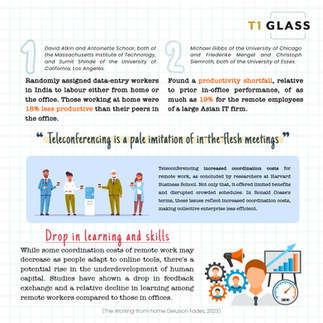The Illusion of Working-from-Home Fades
- Jul 31, 2023
- 2 min read
Updated: Feb 29, 2024
Working from home does not prove to be more productive than working in an office setting.
As the world adapts to new ways of working, the debate over the effectiveness of remote work versus traditional office settings continues to evolve. In recent months, tech giants such as Apple, Meta, and Google, have made headlines by requiring employees to return to the office at least three days a week. But is this a resurgence of the old corporate ways, or a well-founded decision? Didn’t numerous studies during the COVID-19 pandemic tout the productivity advantages of remote work?
Shifting Perspectives
In 2020, a working paper by Natalia Emanuel and Emma Harrington, then Harvard doctoral students, suggested an 8% increase in the number of calls handled per hour by employees of an online retailer who transitioned from offices to remote work. However, their updated findings, published by the Federal Reserve Bank of New York in May 2023, revealed a surprising twist: productivity had declined by 4%. This revision was not a mistake but a result of more precise data collection, including detailed work schedules.
Remote workers not only answered fewer calls, but the quality of their interactions suffered as well.
Empirical Evidence
Studies by David Atkin, Antionette Schoar, Sumit Shinde, and Michael Gibbs, among others, further questioned the productivity narrative. Data-entry workers in India working from home were found to be 18% less productive, and employees of a large Asian IT firm experienced a productivity drop o fup to 19% when compared to their in-office performance.
The Limits of Teleconferencing
Researchers at Harvard Business School observed that teleconferencing increased coordination costs for remote work, disrupted schedules, and offered limited benefits compared to in-person meetings. This added to the argument against remote work’s productivity claims.
Beyond Productivity
While productivity may be a critical factor, remote work offers more than just efficiency gains. It contributes to employee happiness by eliminating commutes and providing flexibility for personal commitments. Tasks requiring deep concentration often fare better in a home setting. Many workers now prefer remote work to the extent that they are willing to accept pay cuts for the privilege.
The future may see a hybrid work model, striking a balance between office and remote work, with productivity considerations likely to shift the workweek more towards the office.

















